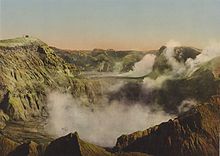| Waimangu Geyser | |
|---|---|
 Eruption of Waimangu Geyser in 1903 | |
 | |
| Location | near Rotorua, New Zealand |
| Coordinates | 38°17′S 176°24′E / 38.283°S 176.400°E |
| Type | Fountain geyser |
| Eruption height | up to 1,500 feet (460 m) |
| Frequency | ~36 hours (while active before 1908) |


The Waimangu Geyser, located near Rotorua in New Zealand, was for a time the most powerful geyser in the world.
The Geyser was seen erupting in late 1900. Its eruptions were observed reaching up to 1,500 feet (460 m) in height,[1][a] and it excited worldwide interest. Day trip visitors from Rotorua were keen to see the geyser erupting regularly for 5–6 hours out of a cycle of about 36 hours, and a tourist trip called the "Round Trip" ran from the summer of 1902/1903.[5] The geyser was the catalyst for tourism to the Waimangu Valley.
Its workings were apparently created by the great 1886 Mount Tarawera eruption.[6][7] The water expelled by the geyser was black with rocks and mud from the surrounding terrain, so the indigenous Māori people named the geyser Waimangu, meaning 'Black Waters'. The geyser gave its name to the surrounding geothermal region, the Waimangu Volcanic Rift Valley.
Joseph Perry of the Limelight Department of the Salvation Army filmed the Waimangu Geyser in action.[8]
In August 1903, tourist guide Alfred Warbrick measured the depth of the 260-by-430-foot (80 m × 130 m) geyser lake at only 48 feet (15 m) when he launched a rowboat on the lake as a result of a dare.[5] The lake's shallow depth was attributed to much of the ejected solid material falling back into the vent each time.
On 30 August 1903,[9] New Zealand rugby international Joe Warbrick, David McNaughton, and sisters Ruby and Catherine Nicholls were killed after venturing close to the edge of the geyser, having ignored requests from Warbrick's brother Alfred to return to a safe distance. The four were scalded and then swept away in a sudden violent eruption.[10]
In mid-1904, the geyser became dormant for several weeks and subsequent eruptions were shorter and weaker until they stopped on 1 November 1904.[1][b] This coincided with a landslide that changed the water table of Lake Tarawera by several metres. While it was hypothesized that this was the cause for the extinction of the geyser,[11] later studies found no apparent physical connection between these two events.[5]
The geyser became extinct in 1908.[12][b] Afterwards, hydrothermal activity in the nearby Echo Crater increased, leading to eruptions in the crater in 1915, 1917, and 1924.[7]
- ^ a b Stewart, C. 'Hot springs, mud pools and geysers - Geysers', Te Ara - the Encyclopedia of New Zealand. Retrieved 1 February 2024.
- ^ Glennon, J Allan "World Geyser Fields" Archived 2007-06-30 at the Wayback Machine Retrieved on 2008-04-04
- ^ . Encyclopædia Britannica. Vol. 11 (11th ed.). 1911. pp. 913–915.
- ^ Hurwitz, S.; Manga, M. (2017). "The Fascinating and Complex Dynamics of Geyser Eruptions". Annual Review of Earth and Planetary Sciences. 45 (1): 31–59. doi:10.1146/annurev-earth-063016-015605.
- ^ a b c Information panel "Waimangu Geyser 1900–1904" at geyser site
- ^ Moore, E. S. (November–December 1917). "The Active Volcanoes of New Zealand". The Journal of Geology. 25 (8). University of Chicago Press: 708. Bibcode:1917JG.....25..693M. doi:10.1086/622540.
- ^ a b "Waimangu: Geology". GNS Science. Retrieved 2014-12-22.
- ^ "SALVATION BIORAMA". Darling Downs Gazette. Vol. XLVI, no. 11055. Queensland, Australia. 15 February 1904. p. 3. Retrieved 2020-10-08 – via National Library of Australia.
- ^ Information panel at Warbrick Terraces
- ^ "Waimangu Geyser - 1903". New Zealand Disasters and Tragedies. United Press Association. August 31, 1903. Retrieved 2007-01-21. – "Rootsweb is currently unavailable", 1 January 2018.
- ^ MacLaren, J. Malcolm (November 1906). "The Source of the Waters of Geysers'". The Geological Magazine. 3 (11). Cambridge University Press: 512. doi:10.1017/s0016756800118898.
- ^ Scheffel, Richard L.; Wernet, Susan J., eds. (1980). Natural Wonders of the World. United States of America: Reader's Digest Association, Inc. pp. 409–410. ISBN 0-89577-087-3.
Cite error: There are <ref group=lower-alpha> tags or {{efn}} templates on this page, but the references will not show without a {{reflist|group=lower-alpha}} template or {{notelist}} template (see the help page).